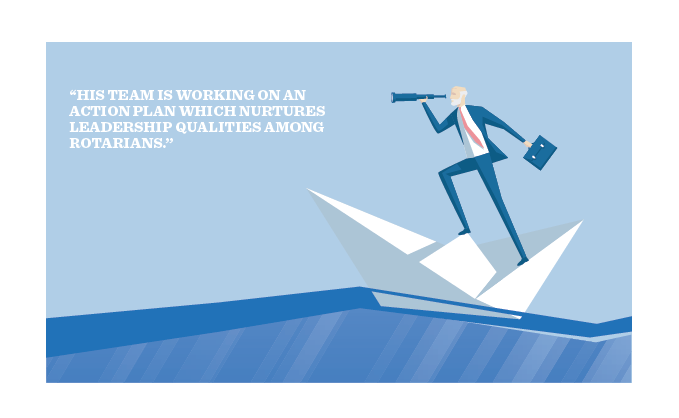
Former Rotary International President, Barry Rassin, is spearheading a taskforce which is looking at the future shape of the organisation globally
Barry Rassin has spent a lifetime working in the health service, initially in America and, more latterly, at home in the Bahamas.
So the former President of Rotary International is well positioned to take the temperature of Rotary as the world fights back against COVID-19.
“We are doing very well as an organisation,” he assesses. “We are almost at stability with our number of members, but that is dropping only because of COVID-19.
“Basically we are stable at 1.2 million members, but I don’t think that is healthy. We need to grow, even though Rotary’s numbers are better than most other organisations like ours.
“On the other hand, our service around the world is extraordinary. I see us as the best humanitarian organisation in the world.
“We are still doing the work of Rotary. But, with the challenges of membership, my thinking is that we could do a lot more service if we could solve that challenge of engaging our members and meeting their expectations about what we do today.
“One of our biggest downfalls is that we have lost 1.4 million people from Rotary in the last 10 years. We are bringing in members, but the losses are something we have to fix.”
Cue Barry’s latest role as chairman of the ‘Shaping Rotary’s Future’ committee, bringing together many leading lights in the organisation, as well as the Rotary International team in Evanston, USA.
Their brief is simple. To look at Rotary in light of today’s world, answering the question: if Rotary started now as an organisation, what would it look like?
One hundred and sixteen years on from when Paul Harris founded Rotary as a business networking club in Chicago, so the nature and shape of Rotary, as well as the world, has changed.
It is fair to say, too, there has been a seismic change in both since Barry was President of this global movement between 2018/2019.
Paul Harris’s 1905 model was a networking model. Today, Rotary is a member organisation which does service. The challenge is to provide the support and relevance to Rotarians so they can appreciate being part of the movement.
Rotary’s core values will always remain the same. “But we will create a structure that will enable us do even more than we have done so far, in a much better manner,” he explained.
The roadmap is to create a Rotary structure which is more regionalised, by definition, rather than Rotary’s 34 zones which are defined by number of members. His team is working on an action plan which nurtures leadership qualities among Rotarians.
With each zone having an average membership of 35,000 Rotarians, there is a need to differentiate, said Barry, on the basis of culture, demography and other unique features, without compromising on Rotary’s values.
“The idea is that the structure should be closer to the Rotary clubs so that we are able to enhance our Rotary clubs,” he explained.
“There are weak clubs around the world and we are not addressing that issue.
“District Governors are overwhelmed with all the duties of administration. We want to create a structure which will be able to help every single club, giving them a degree of priority.
“Less than 6% of our District Governors are under 60, so we are not getting our younger people to take on leadership roles because it is extremely time-consuming. So let’s break it down.”
What is being hatched are regional pilots, with Australia, New Zealand and the Pacific islands likely to develop the plan for development and communication during this Rotary year, with a start in 2022-23.
Districts would be brought together under a regional board defined by language, culture, and geography. There would also be an international global cadre - a pool of experts in various facets of Rotary working closely with clubs.
The cadre would have no administrative responsibility, but would focus instead on bringing their expertise to the clubs.
At the local level there would be sections of clubs, with maybe 10 to 25 clubs, led by a Section Leader who would only be responsible for guidance and motivation.
“The key is getting to all the clubs to make better clubs,” added Barry. The administrative responsibilities move to the Regional Board and the club motivation goes to the Section Leader.
In this post-Covid era, the London-born Rotarian stressed that every Rotary and Rotaract club needs to re-think about what they are doing, and how they are doing it. “We are asking clubs to think if they are relevant to today’s world.
“We want them to step back and ask themselves: are we meeting the needs of our community, are we representing our community by having members from all aspects and are we engaging every member of our club to be engaged in everything that we do?”

Asked what Paul Harris might say to the current generation of Rotarians, Barry Rassin laughed, and replied: “Paul Harris would say, remember what I said: ‘Sometimes we are evolutionary and sometimes we need to be revolutionary’.
“I am one of those who believes we need a revolution.
“I believe this is a tipping point for us. COVID-19 has created this opportunity for us.
“If we don’t protect our membership, everything else is going to decline. We have got to fix that, because if we don’t we stop doing the level of service, then we stop donating to the Foundation, and so on.
"Membership is key, but the bigger picture of Rotary has got to be dealt with.”